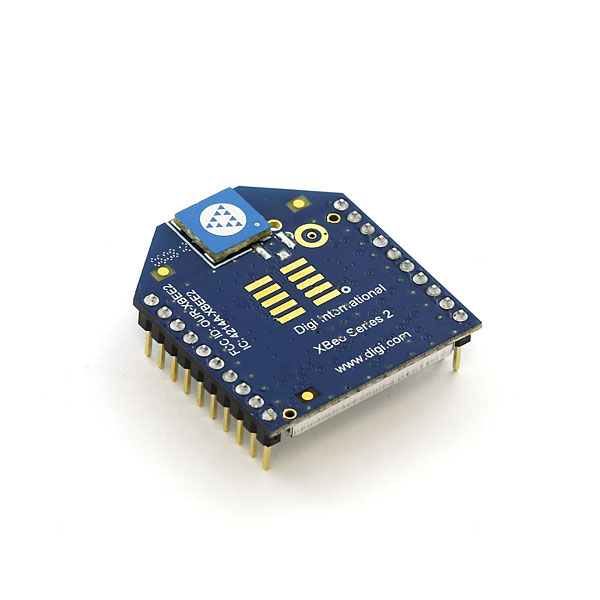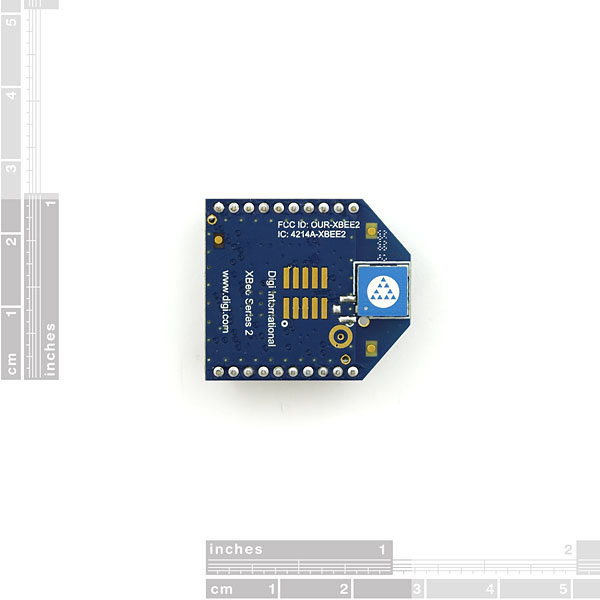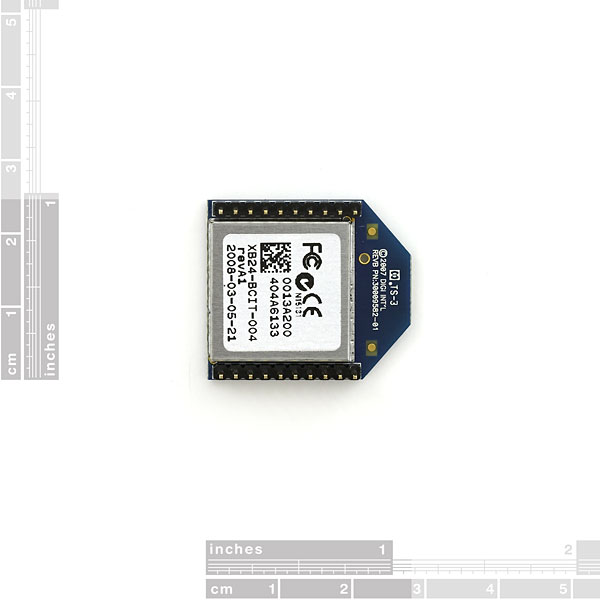XBee 2mW Series 2.5 Chip Antenna
Replacement:WRL-10414. This new version is a Series 2 which uses a much newer firmware. It is compatible with the Series 2.5, if you upgrade the firmware through X-CTU.
This is the 2.4GHz XBee XB24-BCIT-004 module from Digi (formally Maxstream). Series 2.5 improves on the power output and data protocol. These modules take the 802.15.4 stack (the basis for Zigbee) and wrap it into a simple to use serial command set. These modules allow a very reliable and simple communication between microcontrollers, computers, systems, really anything with a serial port! Point to point and multi-point networks are supported.
Please Note: Series 1 and Series 2.5 XBee modules have the same pin-out. However, Series 1 modules cannot communicate with new Series 2.5 modules.
- 3.3V @ 40mA
- 250kbps Max data rate
- 2mW output (+3dBm)
- 400ft (120m) range
- Built-in antenna
- Fully FCC certified
- 6 10-bit ADC input pins
- 8 digital IO pins
- 128-bit encryption
- Local or over-air configuration
- AT or API command set
Comments
Looking for answers to technical questions?
We welcome your comments and suggestions below. However, if you are looking for solutions to technical questions please see our Technical Assistance page.
Customer Reviews
No reviews yet.




Notice that you cannot remotely program this because of missing lines.
See http://arduino.cc/en/Main/ArduinoBoardFioProgramming :
"You can't use the DigiMesh or ZB series radios (aka Series 2 or 2.5). Those modules do not allow for automatic IO Line Passing that is required for toggling the reset pin when programming."
I think this should be added to product description.
Thank you for the great information! Because these modules are not built specifically for Arduino, I'm going to leave this note/recommendation in the comments.
Uh, oh. You're absolutely right Nate.
Here's some notes that I've made to get 2.5 working:
http://mitat.tuu.fi/?p=90
I've written a howto on my site for how to get effective configuration with these modules.
http://t413.com/news/fast-2-way-xbee-series-2-data
Hope it helps someone.
The XBee is indeed an excellent wireless module. Be careful about deciding which series (1 or 2/2.5) to get though. The series 2/2.5 modules do not have the extremely useful io line passing that the series 1 modules have! In fact unless you need the mesh networking, you should probably go for series 1.
Hello onash. What do you mean with "IO line passing" exactly?
A little late on the reply here, but he means that the series-1 XBees supported I/O line "mirroring" (passing) between two XBees; basically, input on one pair of pins on an XBee would be passed as output to a pair of pins on the receiving XBee.
Think of it as a virtual pin passthough connection from one XBee to another; like a virtual wire coming straight from your sensor. It makes it really easy to "wirelessly attach" a remote sensor just like it was wired up locally. See ladyada's XBee relay control video for a demo of this in action.
The series 2/2.5 XBees don't support this out of the box, so if that's a requirement for your application, you'd want to add a micro to do the parsing/retransmit work for you, or use a series-1 XBee instead.
Hi !!!
Can I communicate two Xbee: one is Serie 2 and the other one is Serie 2.5 ???
What I need to do with their configuration?
Regards
This product is retired, as I can see. Which one replaces it? Will 2.5 be compatible with new modules (is there a firmware upgrade needed, or something)?
I also need some information regarding the reason of this retirement. I started a project with these modules, and now I'm kind of stuck. Shoud I go back to series 1 for the rest of my project?
I also was working in a project with three of these devices. Two days ago, one of them stop working and I wanted to buy a spare one. To my surprise, these have been retired.
Did I lose my initial investment?
Which one should I buy that will allow me to replace the one that stop working and continue using the ones that I bought?
Series 2 can be talked into doing much of what series 1 does but can do lots more. Great for those who need it. Great config overkill for those who need a simple serial link. As illustration here is a URL to docs for one of the more recent incarnations: http://ftp1.digi.com/support/documentation/90000991_B.pdf
You see how you assemble commands as packets that gets send to a destination node, and such. The posts by Finnishguy and timo are valuable.
Hi, I need to program this to make a one way data transfer. How can I do that?
WARNING! WARNING WILL ROBINSON! Think twice about buying the series 2 modules. I have no idea why this is not posted anywhere but in a nutshell, these are a royal PITA to get configured. If it weren't for timo posting his link here, I would have never gotten these guys working. They are simply not friendly to 2-way communication. From everything I have read, the series 1 and the pro's are out-of-the-box good to go, and the 2.5's... Not so much.
Can someone tell me if I were to combine a lower 2mW with a 50mW Xbee the sort of range I could expect? (sorry Im a newb!)
thx!
I got 15 meters indoors between 3 strong concret walls without losing any packet.
The base was a XBee Pro 2.5 50mw with the small wire antenna and the other unit was a Xbee 2.5 2mw with a chip antenna.
Why are the Series 2.5 modules not compatible with the Series 1 modules? That worries me a little, to be honest... The product information of both modules state they use 'the 802.15.4 stack, the basis for Zigbee'. Doesn't that mean they should be able to communicate through the ZigBee protocol? Apparently they don't, but can anyone explain why?
Let me put it this way: I want to use a lot of XBee modules to create a ZigBee mesh network; what series/type should I use?
Thanks in advance for the help.
You'll want series 2/2.5 for mesh networking. The only advantage that series one is going to give you is the ability to program an arduino wirelessly or if you need a wireless connection that mimics a serial cable.